The Epic Meltdown of Democracy's Most Dangerous Alliance
Plus: Bruce Springsteen's moral clarity, fusion breakthroughs, and letters delivered across continents
Today marks 81 years since American and other Allied troops stormed the beaches of Normandy to liberate Europe from fascism. Who could have predicted that eight decades later, Europeans would watch in horror as America pushed the self-destruct button by democratically voting for a president now delivering the American-branded version of the very fascism they once defeated?
The latest chapter in this American tragedy unfolded overnight. While you were sleeping, the most corrupt alliance in recent American political history tore itself apart in real time. But beyond the billionaire meltdown, scientists achieved fusion records, conservationists celebrated baby devils, and one man spent a year hand-delivering letters to strangers across 52 countries.
This newsletter exists to capture both the urgency of our political moment and the quieter stories of human progress that remind us why hope isn't naive; it's necessary.
When Billionaire Egos Collide
The most entertaining political theater this week isn't happening in Congress; it's unfolding on social media between Donald Trump and Elon Musk. As the 1974 Sparks hit put it: this town ain't big enough for both of us.
After Trump told reporters Thursday he was "very disappointed with Elon" over Musk's criticism of his spending bill, Musk fired back with "Without me, Trump would have lost the election" and accused the president of "such ingratitude." What started as a disagreement over Trump's "Big Beautiful Bill" devolved into a spectacular public meltdown complete with impeachment calls, Epstein accusations, threats to cancel government contracts, and even mockery of Musk's black eye.
Trump, speaking in the Oval Office while the German chancellor looked on in apparent bewilderment, questioned why Musk didn't cover up his black eye with makeup. Nothing says presidential dignity quite like critiquing your former ally's bruises during a diplomatic meeting. The same meeting where Trump managed to suggest that D-Day, today's 81st anniversary, wasn't a pleasant day for Germany. When Chancellor Friedrich Merz mentioned the D-Day anniversary, Trump asked, "That was not a pleasant day for you?" Merz had to explain that D-Day represented "the liberation of my country from Nazi dictatorship." The irony was lost on Trump: the descendants of those who liberated Europe from fascism now watch their liberators embrace it. Trump's grasp of history apparently extends about as far as his understanding of loyal friendship.
The fight reached peak absurdity when Musk accused Trump of hiding Jeffrey Epstein files because they implicate the president. This comes from a man who was himself photographed at parties with Ghislaine Maxwell. Tesla shares dropped 14% as the drama unfolded, wiping roughly $152 billion off the company's value.
But here's why this public meltdown matters beyond entertainment value: we're watching the most corrupt alliance in recent American political history tear itself apart in real time. As they claw at each other, both men are confirming what we suspected all along. Trump admits Musk was always just in it to enrich his companies. Musk confirms Trump was always for sale. Two men who built their brands on claiming they're brilliant dealmakers just proved they can't even manage their own friendship, and in doing so, revealed the hollow core of their entire political project.
The Boss Reminds Us What's at Stake
While Trump and Musk were busy destroying each other on social media, Bruce Springsteen stood on stage at Liverpool's Anfield Stadium Wednesday night. He delivered something we desperately needed: moral clarity. Speaking to a crowd that had come to hear rock and roll, the Boss instead gave them a reckoning.
"In America, my home, they're persecuting people for using their right to free speech and voicing their dissent. This is happening now," Springsteen told the audience. He didn't stop there. "In America, the richest men are taking satisfaction in abandoning the world's poorest children to sickness and death. This is happening now."
The speech was a catalog of everything wrong with Trump's America: the sadistic pleasure in inflicting pain on workers, the rolling back of civil rights, the abandonment of allies, the siding with dictators. But Springsteen ended with hope, quoting James Baldwin: "In this world, there isn't as much humanity as one would like, but there's enough." (Video via Songsbyspringsteen on IG)
That humanity Springsteen spoke about shows up every day in stories that don't make headlines while billionaires wage Twitter wars. This newsletter exists to find those stories. I write to you about the scientists making breakthroughs, the communities coming together, and the quiet acts of progress that remind us why hope isn't naive; it's necessary.
Subscribe for independent journalism that counterbalances daily negativity with stories of human progress and breakthrough discoveries. Support journalism that refuses to surrender to negativity.
When Stars Meet Their Match
Astronomers have discovered the most powerful cosmic explosions since the Big Bang itself. These "extreme nuclear transients" occur when massive stars that are at least three times the size of our sun get torn apart by supermassive black holes, releasing energy 25 times greater than the most powerful supernova ever recorded.
Unlike typical stellar explosions that last hours, these cosmic monsters stay bright for years, with one event releasing more energy than 100 suns would produce in their entire lifetimes. The discovery came from researchers at the University of Hawaii who noticed unusually bright, long-lasting flares from distant galaxy centers.
These explosions are windows into the universe's violent youth. Their incredible brightness means astronomers can observe them across vast distances, providing insights into how black holes grew when the universe was half its current age and galaxies were forming stars ten times more vigorously than they do today.
From Fusion Breakthroughs to Flying Blind
While Trump and Musk demolish their alliance, scientists are quietly building the future. German researchers at the Wendelstein 7-X stellarator just smashed nuclear fusion records, achieving a new benchmark that brings us closer to unlimited clean energy by maintaining plasma at 30 million degrees Celsius for 43 seconds. They did this by firing 90 frozen hydrogen pellets into the plasma at bullet speed while coordinating microwave pulses—the kind of precise, collaborative science that offers genuine hope for a fossil-fuel-free world.
Meanwhile, Trump's war on science is already causing real damage. Florida meteorologist John Morales warned viewers this week that he may not be able to correctly forecast incoming hurricanes because Trump's cuts have left weather service offices 20% to 40% understaffed and reduced weather balloon launches by 20%. "We may be flying blind," Morales told his audience, explaining that NOAA's hurricane hunter aircraft may not fly this season, meaning "we may not exactly know how strong a hurricane is before it reaches the coastline."
These developments illustrate America's position in the world of science under the Trump administration: scientists in Germany are achieving fusion breakthroughs that could power civilization cleanly for centuries, while scientists in America are being stripped of the resources to warn us about next month's storms. Meanwhile, Chinese scientists aren't sitting still either. While American meteorologists are forced to fly blind, others are literally restoring sight.
Chinese researchers at Fudan University have developed a retinal implant using metallic nanoparticles that partially restored vision in blind mice. The tiny particles take over the function of damaged retinal cells, converting light into electrical signals the brain can understand. In tests, mice with the implants succeeded at visual tasks 68% of the time compared to just 27% for untreated blind mice. This research offers hope for people with conditions like macular degeneration.
As NOAA predicts an active hurricane season with up to five major hurricanes, meteorologist Morales urged viewers to "call your representatives and make sure these cuts are stopped." The irony is perfect: while politicians choose blindness, scientists keep finding new ways to help us see.
Devils in the Details
Conservation has its victories and setbacks, sometimes within the same sanctuary. At Aussie Ark's Barrington Tops sanctuary in northern NSW, ten new Tasmanian devil joeys have been confirmed as the newest members of mainland Australia's largest devil population, with up to four more females expected to conceive in June. The devil joeys represent hope for a species that's slowly reclaiming mainland Australia after disappearing 3,000 years ago.
The timing couldn't be better since nature doesn't always cooperate with conservation timelines. The same sanctuary recently faced catastrophic flooding after 400mm of rain fell in three days, forcing a mass evacuation of endangered animals and causing extensive damage to wildlife fencing and infrastructure.
Fortunately, all the joeys, mothers, and fathers survived the deluge. The resilience mirrors broader conservation successes across Australia. In South Australia's Ikara-Flinders Ranges, western quolls and brushtail possums are thriving ten years after reintroduction, with rangers recently catching and releasing 135 quolls and 30 possums over five nights. The quolls, which disappeared from the Flinders Ranges in the 1880s and are now extinct everywhere except part of Western Australia, are breeding successfully in "safer havens" where feral animals have been reduced.
Small Victories, Global Impact
Six gray seals that had become entangled in fishing gear and debris near Block Island, Rhode Island, were recently released back into the Atlantic after weeks of rehabilitation at Mystic Aquarium. The seals had severe infected wounds that required antibiotics. Experts have now equipped them with tracking tags that will provide real-time data about their location, diving depth, and behavior.
The rescue highlights a growing crisis: nearly 100,000 marine mammals are killed or injured each year after becoming ensnared in discarded plastic, from fishing gear to everyday items like frisbees that end up around their necks. But it also shows what's possible when humans choose to help rather than harm.
That choice is paying off on much larger scales too. In South Africa's Greater Kruger region, researchers discovered that dehorning rhinos reduces poaching by nearly 80%. It's a measure that turns out to be far more effective than traditional anti-poaching methods like rangers, helicopters, and tracking dogs that cost millions of dollars but showed no statistical impact on reducing rhino deaths. The procedure, which involves sedating the animal and cutting off the horn with a power saw, poses minimal risk and costs just 1.2% of the overall rhino protection budget.
Meanwhile, Colombia reported a 33% drop in deforestation in early 2025, with Amazon national parks seeing a 54% reduction in forest loss. The progress comes from community agreements, institutional strengthening, and joint operations targeting environmental crime, proving that when governments commit to protecting nature, it works.
The rhino study raises uncomfortable questions about whether arresting poachers matters if rhinos keep dying, but it also offers hope when a simple solution works best. From individual seals learning to flop their way back into the ocean to entire ecosystems getting a reprieve, conservation succeeds when we choose effectiveness over symbolism and protection over punishment.
Each morning before dawn, I dig through scientific journals, conservation reports, and community stories that mainstream outlets ignore. Your subscription supports independent journalism that refuses to surrender to negativity.
Letters to Strangers
In 2023, grief took Jonny Beardmore to the Galápagos Islands, where he discovered something remarkable at Post Office Bay on Floreana Island.
An old whisky barrel serves as a postbox, continuing a tradition started by sailors in 1793. Travelers leave letters and take ones they can hand-deliver to their destinations. The barrel was overflowing with postcards waiting for delivery. Beardmore took a couple home to New Zealand and delivered them; one was from a student to their teacher, and another was from a girl to her boyfriend. The recipients were incredibly grateful.
That simple act sparked an extraordinary year-long journey. In March 2024, Beardmore returned to collect 55 letters covering a vast geographic area and set himself a challenge: deliver one letter per week across 52 countries and all seven continents. He kept his remote job, used air miles, and documented the journey to raise awareness about motor neuron disease. This condition had taken his father and left him searching for meaningful human connection in a world that had suddenly felt much smaller.
The deliveries weren't always smooth. In Bergen, Norway, he nearly got arrested when a woman mistook his selfie stick for a weapon and called the police. In Belize, he delivered a love letter to a man who had just broken up with his partner, though weeks later, they were back together. His favorite was letter eight in Mexico City, from a daughter thanking her mother for letting her follow her dreams despite the mother being seriously ill.
When Beardmore finished his challenge in March this year, he threw a party in London and invited everyone he'd met along the way. People came from all over the world. "I was so touched and humbled," he said. "I've made friends for life."
Finding Balance in Chaos
Today's news captures a world balanced between the spectacular collapse of corrupt alliances and the quiet persistence of human decency. While billionaires destroy each other over spending bills, scientists are solving the universe's deepest mysteries, and ordinary people are crossing continents to deliver mail.
The fierce political battles remind us that democracy requires constant vigilance against authoritarianism, not just from politicians but from artists like Springsteen, who speak truth to power. Meanwhile, scientific discoveries, conservation victories, and human stories remind us of our species' remarkable resilience and creativity.
Every fusion breakthrough, every rescued seal, and every letter delivered by hand is a thread in the fabric of a better future that gives hope. And we all know we need hope these days.
Until the next brew, ☕️
Alexander
Daybreak Notes & Beans delivers hope over despair and inspiration over inflammation. Your subscription supports independent journalism that refuses to surrender to negativity by delivering breakthrough discoveries, conservation victories, and stories of human connection every morning with your coffee.
Or perhaps you liked the article and want to support my writing by buying me a coffee?
Yesterday’s newsletter:
The Military Officers Trump Doesn't Want vs. The 22-Year-Old He Put in Charge of Fighting Terrorism
Good morning from my coffee corner. American democracy wrestles with who belongs and who doesn't. I was shocked by the story of the three Air Force Academy cadets who stood in formation last week holding their diplomas, but the government denied them their commissions. Their only disqualifying factor? Being transgender.
Notes
Trump-Musk feud: Fortune, 'Elon Musk says without me, Trump would have lost the election after the president says he's very disappointed in the world's richest man'
Trump-Musk fallout: The Guardian, 'What we know so far: Trump and Musk's spectacular public blowup rocks Washington'
Trump-Musk social media duel: The Guardian, 'Impeachment, Epstein and bitter acrimony: Trump and Musk joust in astonishing social media duel'
Cosmic explosions: Space, 'Astronomers discover most powerful cosmic explosions since the Big Bang'
Nuclear fusion: LiveScience, 'Nuclear fusion record smashed as German scientists take a significant step forward to near-limitless clean energy'
Weather forecasting cuts: The Guardian, 'Flying blind: Florida weatherman tells viewers Trump cuts will harm forecasts'
Retinal implants: New Scientist, 'Retinal implant restores sight for blind mice'
Tasmanian devils: AAP, 'Baby blitz set to continue with gnarly devils'
Conservation flooding: AAP, 'Floods threaten vital Tasmanian devil breeding program'
Quoll reintroduction: The Guardian, 'Western quolls and brushtail possums thrive in national park a decade after reintroduction'
Gray seals: PBS NewsHour, 'Group of rescued gray seals heads home after rehabilitation'
Rhino dehorning: The Guardian, 'Dehorning rhinos reduces poaching by 80%, study finds'
Colombia deforestation: AP News, 'Colombia reports 33% drop in deforestation in early 2025, with major progress in Amazon parks'
Letter delivery: The Guardian, 'Experience: I travelled the world delivering letters to strangers'

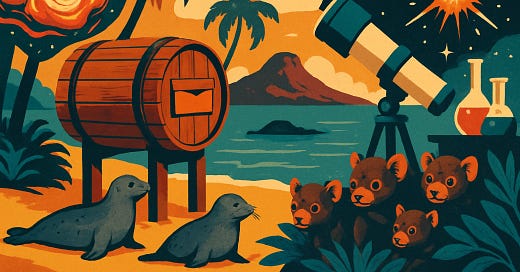




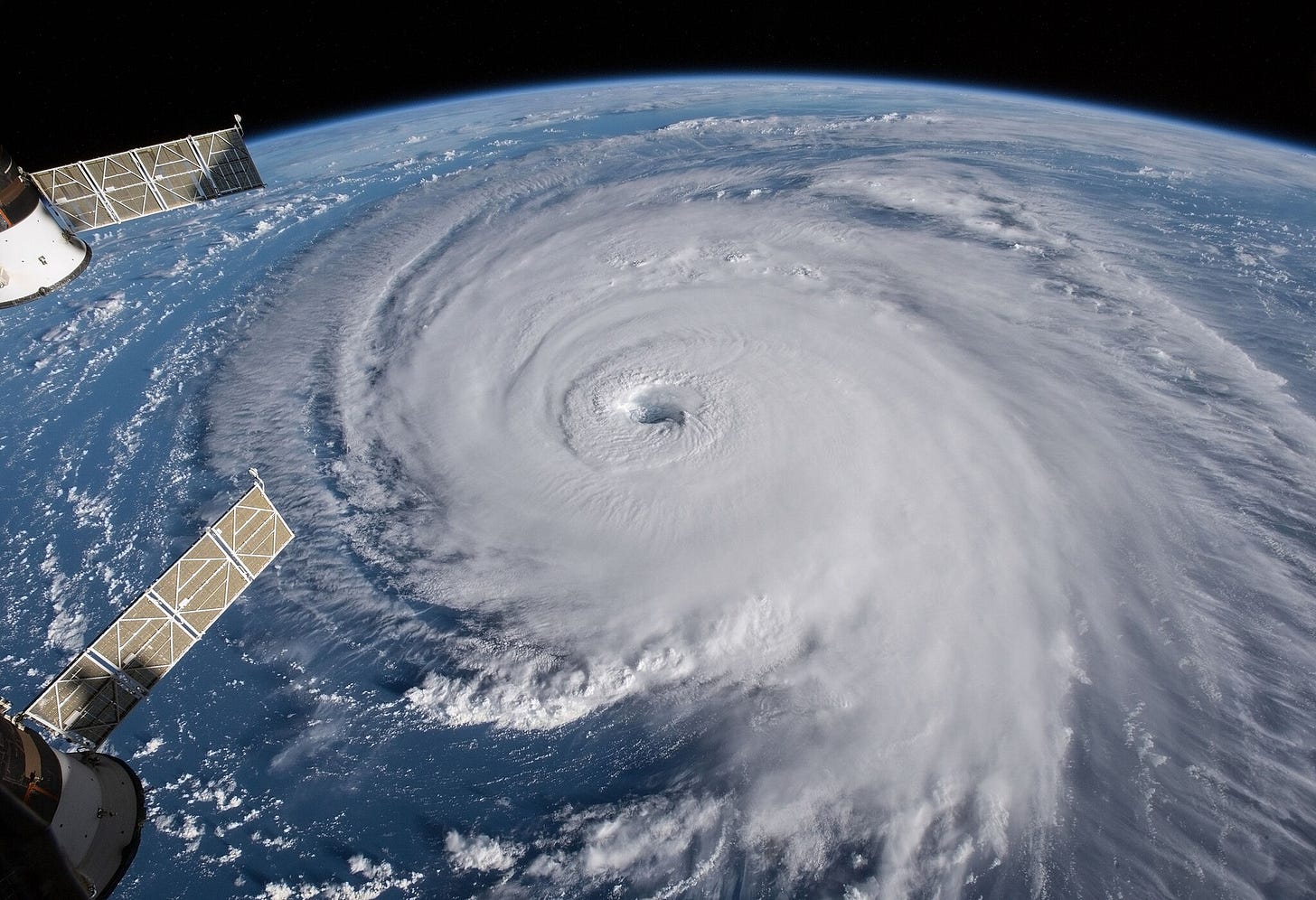
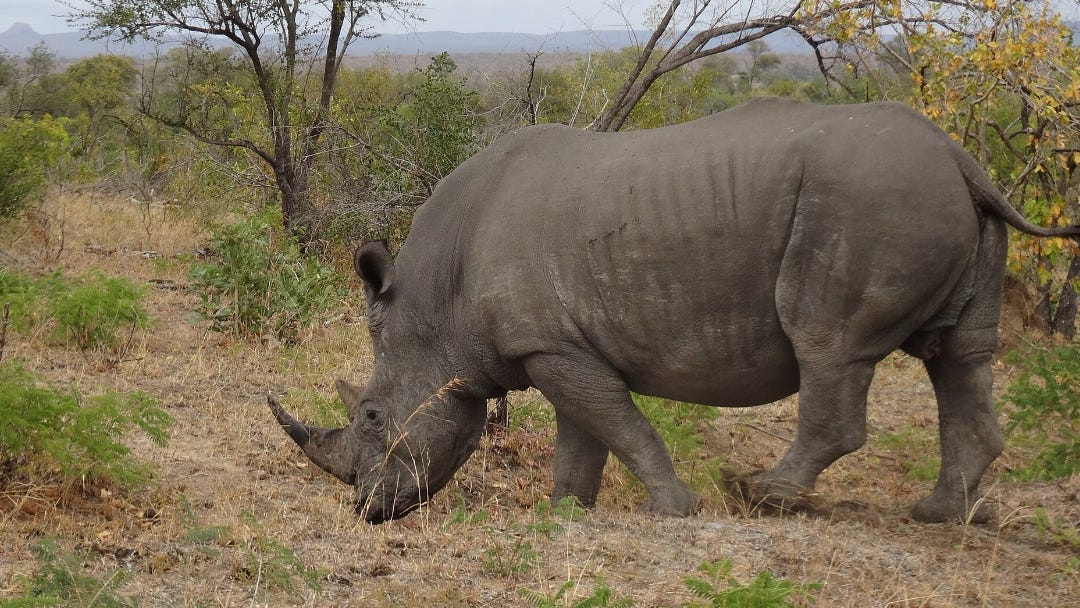
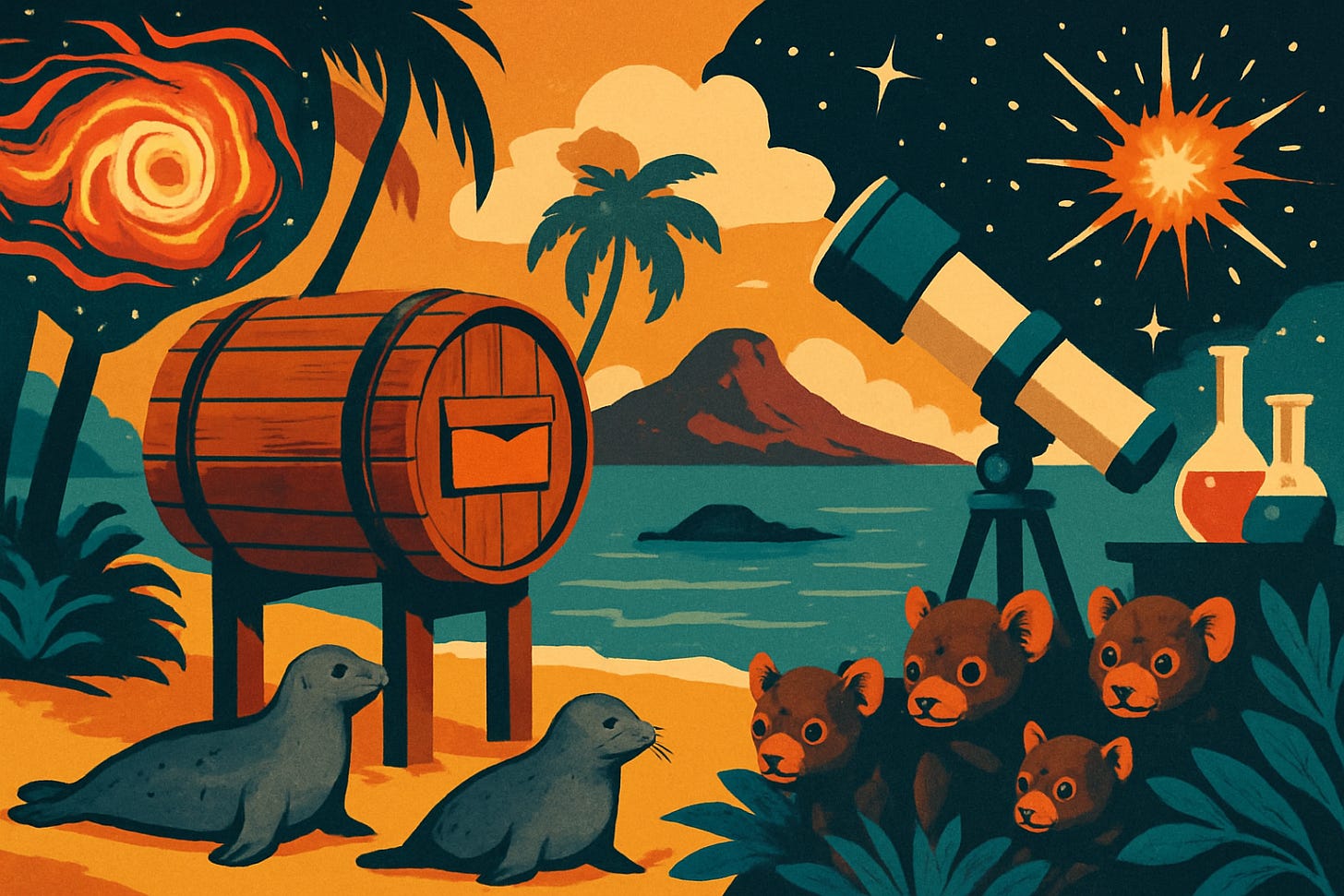
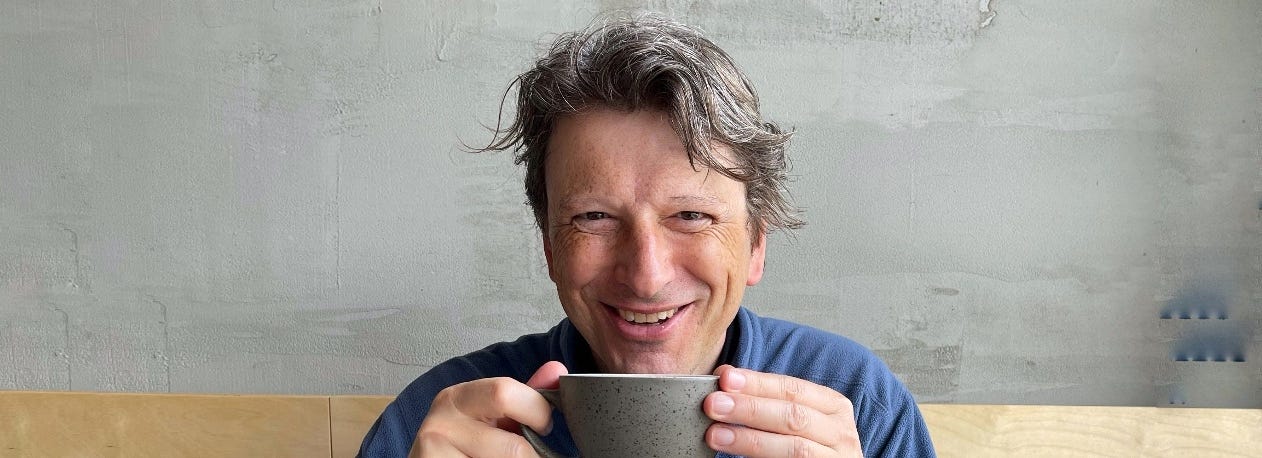

"While billionaires destroy each other over spending bills, scientists are solving the universe's deepest mysteries, and ordinary people are crossing continents to deliver mail."
A remarkable collection of news this morning. Saving gray seals and Tasmanian devil joeys, getting closer to unlimited clean energy, The Boss keeps political commentary in his successful tour, and friends for life during the one letter per week challenge of a kind man. ☕
Fusion energy research is being done around the world. Late last year, a Canadian company achieved noteworthy results by trying a new, lower cost technique that may be more practical for affordable fusion energy infrastructure.
https://betakit.com/general-fusion-takes-major-step-in-quest-for-canadian-fusion-reactors/